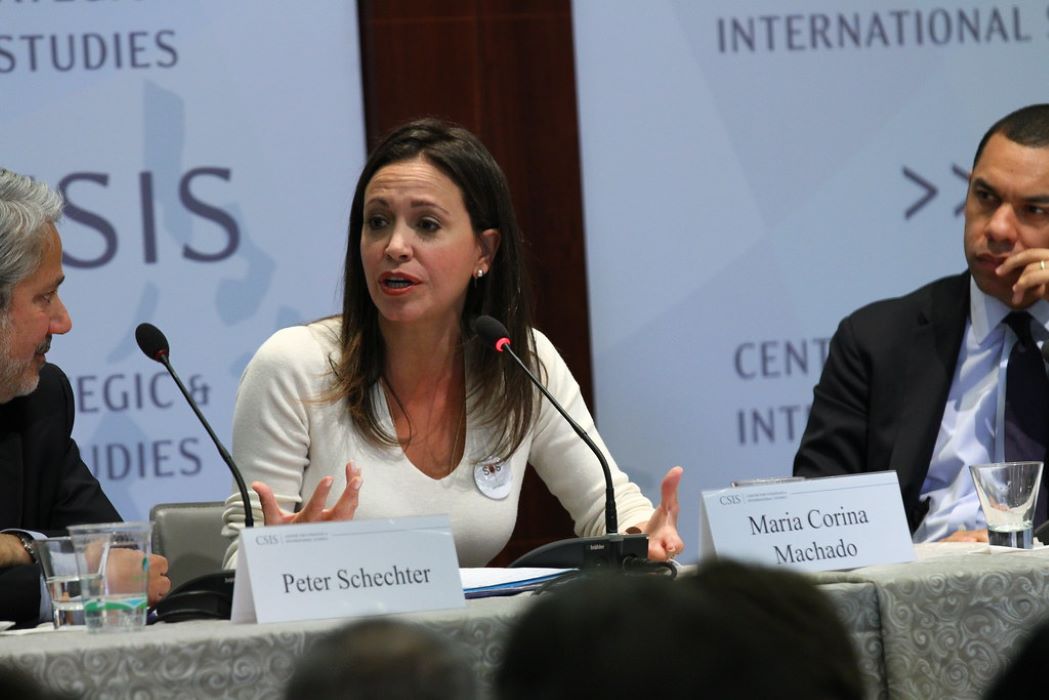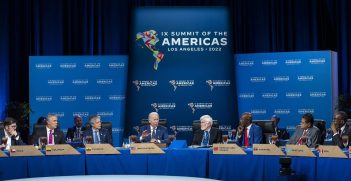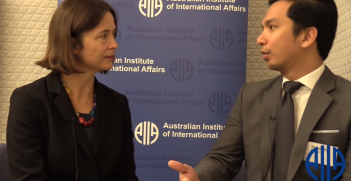Sisyphus in Caracas (or how the Venezuelan opposition keeps on throwing stones on its own roof)

In absence of a plan B for the 2024 presidential elections, support for Maria Corina Machado in the primary elections has brought afloat, yet again, the self-sabotaging tendencies that have characterised the Venezuelan opposition bloc over the past two decades.
“Here comes Mary.” This was Maria Corina Machado’s slogan in 2011, as she competed to become a presidential candidate in Venezuela. Economic crisis was then starting to loom large on the horizon, and those religious invocations came forth unashamedly in her electoral campaign: she wanted to appear as a Marian, miraculous saviour of the Venezuelan people.
The miracle did not eventuate.
Neither appeals to divinity nor material resources (of which Machado mobilised a remarkable amount, considering she lacked support from established political parties) worked for her. She came third in the primary elections then organised by the Democratic Unity Roundtable (a coalition that temporarily amalgamated political forces then opposing Hugo Chávez). Machado captured 3.7 percent of the vote, far from the 64 percent obtained by the victor, Henrique Capriles Radonski.
Capriles Radonski eventually lost to Chávez in the 2012 presidential election by ten percentage points. But this result filled the opposition bloc with much-needed hope. For a change, it seemed possible to contest the electoral dominance of chavismo (the left-leaning political movement built around the figure of Chávez).
Out of that experience, acceptance of electoral competition and inter-party agreements came to guide the opposition bloc’s strategy – temporarily. Indeed, this rendered tangible outcomes in subsequent years: the opposition bloc won a solid majority in the 2015 parliamentary elections after a campaign that, in the main, articulated such strategy.
Fast forward to 2023, the year of Mary’s second coming.
Last October, Machado obtained a landslide win at the primary elections organised by the Unitary Democratic Platform – a new organic façade for political elites’ agreements demarcating common ground among the forces opposing chavismo.
The reliability of those results was questioned by government spokespeople, and the election process was even “suspended” by the Electoral Branch of the Venezuelan Supreme Court (a legal nonsense, since these elections were organised independently from the National Electoral Council). Yet Machado’s victory was swiftly recognised and endorsed by the most prominent leaders of the opposition bloc. Nearly everyone in that bloc seems to be closing ranks with Machado, including former political rivals and the “interim president” now fallen from (US-backed) grace, Juan Guaidó (in US exile).
In appearance, the principles of political coalition and electoral competition are once again being embraced by the opposition bloc.
But are they really? This is far from clear.
In her second coming, Machado’s profile is much closer to that of the reckless avenger than to the Marian conciliator. This hinders her prospects, more dependent on quasi-miraculous events than on warrior muscles and weapons.
Indeed, Machado will require miracles both to compete with Maduro in the 2024 presidential elections and to maintain her current status as a recognised leader of the opposition bloc.
The first miracle would involve a lifting of the legal sanction that bars Machado from holding public office. On the grounds that she supported US-led economic sanctions against Venezuela (which she did) and Juan Guaidó’s “interim presidency”; this sanction extends a previous one that temporarily suspended her access to public offices in 2015.
The new sanction was publicised by the nation’s Comptroller General last June, when Machado was consolidating as a likely leader for the opposition bloc, after the demise of Guaidó was only too apparent. How could Machado emerge as a potentially binding figure among the opposition to Maduro in this conjuncture?
This is a question that can only be answered by considering the damage that Guaidó’s “interim government” has inflected on the development of a democratic opposition to Maduro in Venezuela.
Over the past two decades, Machado has repeatedly negated the legitimacy of political institutions and electoral results in Venezuela (except when these led to her winning a seat in the 2010 parliamentary elections). In the 2002 coup against Chávez she was among the signatories of the so-called “Carmona Decree” (which sought to consolidate the de facto government of Carmona Estanga, dissolving existing constitutional public powers); in 2014 she was among the principal political sponsors of “La Salida” (“The Ousting”) movement, a series of extra-institutional protests, including violent ones, that sought to down Maduro from government. More recently, Machado openly called for a foreign (US-led) military intervention in Venezuela (which she preferred to label “humanitarian intervention”).
With this background, the extent to which the opposition bloc is truly espousing electoral competition as a pillar of their political strategy is doubtful. Not only are they backing a figure that (as they know well) won’t be able to agree with the presidential election; they are backing a figure that has consistently eroded public confidence in elections.
This situation reveals disorientation among the ranks of the opposition bloc, and it does not bode well for the consolidation of Venezuelan democracy in the near future.
This is the outcome of the failed US backed Guaidó’s “interim government,” which was dependent on foreign support as it was detached from organic scaffolding within Venezuela. That shadow government channelled abundant monetary resources that oiled an international bureaucratic network of well-connected elite supporters, but in parallel constrained any organic political developments within Venezuela. As a result, opposition leaders and parties were gradually brought to a dysfunctionality that created the conditions for a sort of inside-outsider maverick to emerge as potential leader. That leader is Machado.
Machado has a long political career. Building it, she has been as disdainful of established political parties as fond of creating her own politically-oriented start-ups. Because of this, she will also need miracle to remain for long as a recognised leader of the opposition in Venezuela.
So what is ahead for Machado in particular, and for the Venezuelan opposition in general?
One view is that pressure from Washington will oblige Maduro’s government to accept the candidature of Machado, and also that this will guarantee victory in the presidential election next year. The US Treasury Department recently announced the temporary lifting of economic sanctions on the Venezuelan oil and gas sectors, issuing licenses that allow investment, participation in production, and commercial sales in those sectors. These licenses are subject to revision in light of political conditions – the fulfilment of the “Barbados Accords” signed by Maduro’s government and the opposition Unitary Platform, accords that pave ground for open electoral competition in 2024. Those who hold this view consider that the US government will make the maintenance of licenses subject to the acceptance of Machado as a candidate to the presidential elections.
It is unlikely that that will be the case. For the US government it will be inconvenient to fully reinstitute the sanctions on Venezuela – even in the case that it wanted to, which is unclear in a geopolitical scenario in which access to resources is growingly complicated. Not only have US companies already signed deals in Venezuela in this scenario, a number of European firms have done so also. It is naïve to think that these firms have risked their capital without some inside knowledge about the duration of the licenses.
Most probably, we will see how Machado also falls from (US-backed) grace, and this fall won’t be cushioned by internal support in Venezuela. Despite the current declarations of opposition leaders, she does not count on sympathy from the political elites of the opposition bloc, and she has never mobilised mass support among the citizenry.
In absence of a plan B for the 2024 presidential elections, support for Machado in the primary elections has brought afloat, yet again, the self-sabotaging tendencies that have characterised the Venezuelan opposition bloc over the past two decades.
Dr Luis Angosto-Ferrández is a senior lecturer in the departments of Anthropology and Latin American Studies at the University of Sydney. He is the author of Venezuela Reframed (Zed, 2015), editor of Democracy, Revolution and Geopolitics in Latin America (Routledge, 2013), and contributor to Latin American Extractivism (Rowman & Littlefield, 2021), as well as the author of many other scholarly pieces on Venezuelan politics and society.
This article is published under a Creative Commons License and may be republished with attribution.





